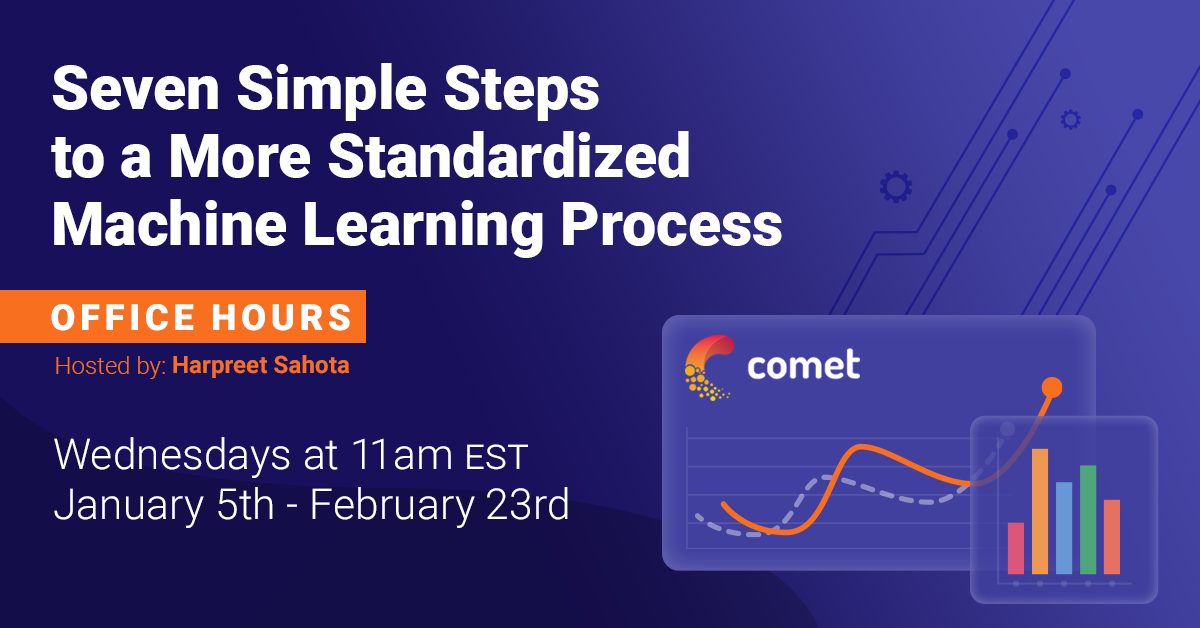Comet Office Hours: Recap for May 23 and May 30, 2022
For the past couple of months, we’ve been working with Harpreet Sahota, a data scientist and host of the excellent The Artists of Data Science podcast, to convene a weekly virtual Machine Learning Office Hours event.
In these ~hourlong sessions, attendees are encouraged to ask questions and engage in deep conversation about all things DS/ML, including technical problems they’re struggling with, learning styles and resources they’ve adopted, and even philosophical discussions about the future of the industry.
Over the past couple of weeks, we’ve had lots of really compelling discussion and perspective. While there’s plenty more to be had in the full recordings, this recap focuses on a few topics that generated some of the most interesting conversations. Enjoy!
May 23, 2021
Dealing with the frustration of data science projects that “fail”
Anamaria Huluba kicked things off with a really poignant line of questioning: Given that industry data suggests more than 80% of Data Science projects fail, how can individual practitioners cope with and react to the idea of failure, especially when they’re just getting started.
Plenty of valuable insights here, but here a couple that stood out:
- Clearly defining failure can help you scope out your project more effectively—and help you ward off personal feelings of inadequacy
- Similarly, starting with well-defined questions about your project—what you’re doing, why you’re doing it, the methods you’ll use—can give important clarity to your approach
- The nature of the data will impact how you define failure and establish your central project questions: Often, it will be much easier to work with data currently being collected as opposed to troves of likely messy data that have already been collected
Check out the full clip below for a deeper look at this discussion:
Re-examining the future of the Data Science profession
In recent years, we’ve all seen the explosion of interest in Data Science, not only as a field that can help operationalize data to help solve difficult problems, but also in the proliferation of training programs, courses, degree programs, and other educational resources designed to help democratize the foundational skills needed to work in the field.
A really interesting conversation broke out this past week regarding this presumed truth, with a number of different (and in some cases surprising) perspectives. Here are a couple of the sub-areas that were tackled within this discussion.
- The future of Data Science as a profession—generalists vs domain expertise: This debate centered on whether the job title “Data Scientist” will largely even exist in 20 years. On the contrary, will domain experts become equipped with basic DS knowledge and easy-to-use tools that make the generalist obsolete? And if so, how will the generalist provide value to organizations that become more and more specialized in how they think about Data Science?
- The pros and cons of no/low-code ML platforms (think AutoML) vs individual best-of-breed solutions for different parts of the ML lifecycle
- How where you’re from can dictate how “generalizable” data literacy—and in the bigger picture Data Science—can actually be.
This is a bit of a longer exchange, but the some expanded discussion, thoughtful analogies, and important questions that remain unanswered are well worth it.
May 31, 2021
The Importance of Certificates in the job hunt
In the most recent session (this past Sunday), a lot of the conversation turned towards education and qualifications, which led to some interesting discussions about the importance of certificates. Some interesting perspective on the need to check off job requirements vs finding other ways to prove your technical skills and potential value.
Check out the full clip for the entire discussion:
Should aspiring data scientists go to grad school?
Somewhat connected to the discussion around technical certificates, there was also a discussion centered on the ways to think about career paths in the field. Is there—or should there be—a more standardized career path for data scientists? Or does that journey depend on where in the field you want to end up.
Some great practical advice by both Harpreet and John Ariansen, host of the How to Get an Analytics Job Podcast included in the clip below:
Enjoy the Conversations Above? Join Us!
We run these virtual Office Hours every Sunday at 12pm ET (New York, NY). Completely free to attend and participate, and we’d love to see any and all of you there, help address any questions you might have, and just hang out and talk all things data science and machine learning!
Register for Comet Office Hours
One last thing…
One more thing I’m really excited about that I’d like to share—we recently launched The Comet Newsletter, which offers a weekly inside look at all things data science and ML, featuring expert takes and perspective from our team. We have big things planned for both Office Hours and the newsletter, so be sure to subscribe if you haven’t already!
Subscribe to the Comet Newsletter
